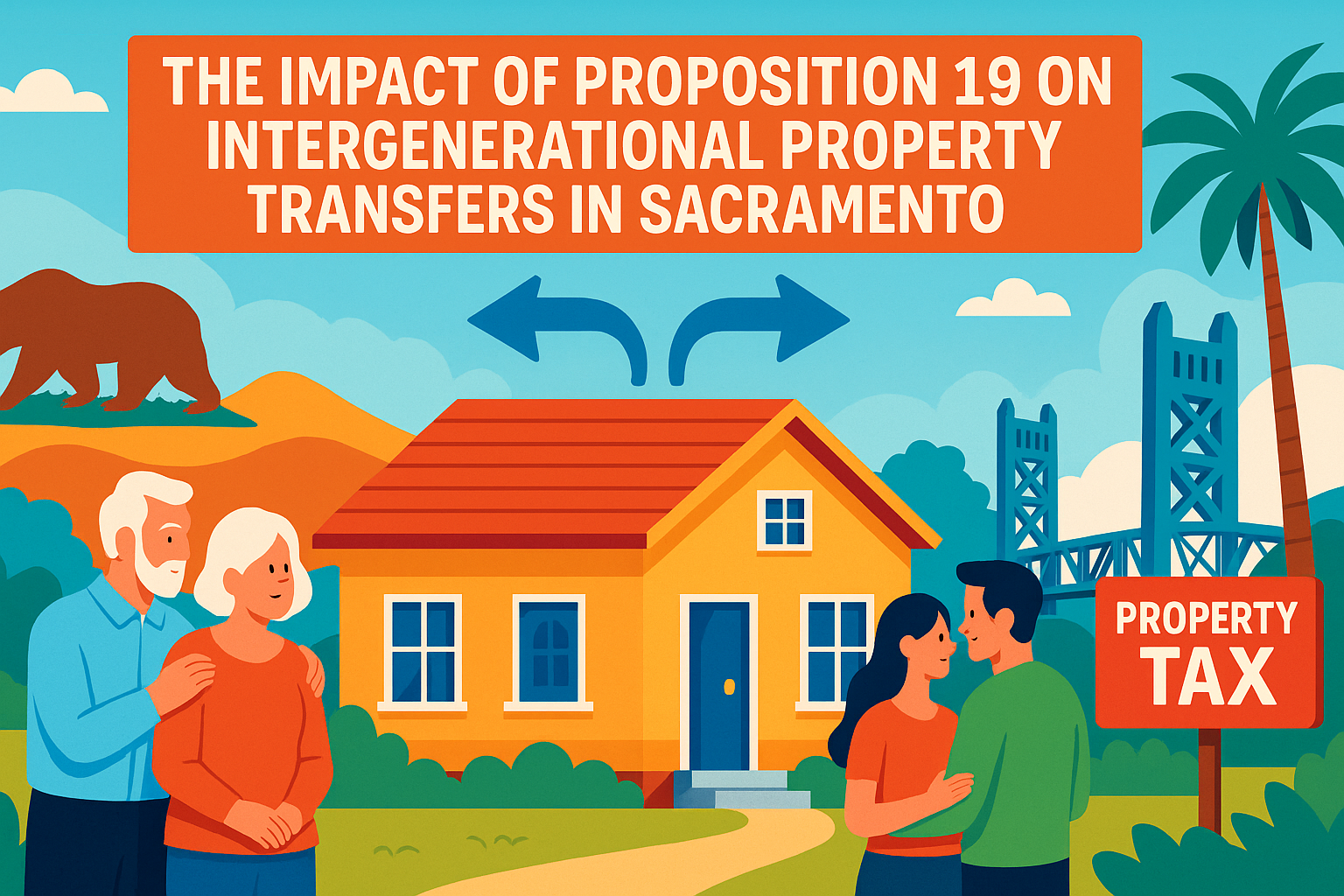
Proposition 19 Property Transfer Rules Explained
California’s Proposition 19 introduced some of the most sweeping changes to the state’s property tax system in decades—particularly when it comes to transferring real estate between parents and children. For families in Sacramento and throughout California, what was once a straightforward way to preserve low property tax assessments and pass down generational wealth has become a more complex, high-stakes process.
Under the old rules, children could inherit their parents’ home—and sometimes even investment properties—without facing a property tax reassessment. This helped many families retain valuable real estate without being burdened by soaring tax bills. But under Proposition 19, those protections have been narrowed significantly. Now, unless specific conditions are met, inheriting real property often comes with a major increase in annual property taxes and in some cases, difficult decisions about whether to keep or sell the family home.
At Hackard Law, we help Sacramento-area families understand and adapt to these new rules. For parents looking to preserve a meaningful legacy—and for children hoping to keep a home that carries both sentimental and financial value—proactive planning has never been more important.
In this blog, we’ll explain what Proposition 19 changed, walk through real-life examples, and offer guidance on how to navigate intergenerational property transfers in light of the law. Whether you’re planning your estate or preparing to inherit, this information can help you make informed choices and avoid costly surprises.
Understanding Proposition 19
Passed in 2020 and fully effective in 2021, Proposition 19 changed how property taxes work in California—especially for families passing property to the next generation.
It did two main things:
- Expanded tax benefits for homeowners 55+, those with disabilities, or disaster victims—allowing them to transfer their low tax base when moving to a new home.
- Restricted the parent-to-child exclusion, which used to allow children to inherit property without a tax reassessment. Now, to keep the low tax rate:
- The child must use the inherited home as a primary residence
- The exclusion applies only to $1 million in value above the home’s assessed value
This second change has made it harder to pass down property without triggering a much higher property tax bill—especially in places like Sacramento with fast-rising home values.
What Changed with Intergenerational Transfers?
Before Proposition 19:
Parents could transfer a primary residence and up to $1 million in other real property (per parent) to children without triggering reassessment of property taxes. Children could maintain the same low property tax basis their parents had, even if they used the home as a rental or secondary residence.
After Proposition 19:
- Only a parent’s primary residence may be transferred without reassessment—and only if the child also uses it as their primary residence.
- The exclusion is capped: The child can keep the parent’s tax basis only on the first $1 million in fair market value above the parent’s assessed value.
- Transfers of rental or vacation homes, commercial property, and other non-residence real estate now trigger full reassessment.
Example: What Proposition 19 Means for a Sacramento Family
Imagine your parents bought a home in East Sacramento in 1985 for $150,000. Over the years, the home’s market value has grown to $1.2 million, but the property taxes are still low—about $2,000 a year—because they’re based on the original purchase price.
Before Proposition 19:
You could inherit that home and keep the low property tax rate, even if you decided to rent it out or use it as a vacation home.
After Proposition 19:
Now, if you inherit the home and don’t move in within a year and make it your primary residence, the county will reassess the property at its full market value. That means your property tax bill could jump from $2,000 to over $12,000 per year—a huge increase.
This is why planning ahead is so important. Families who aren’t aware of the new rules could face unexpected tax burdens—or even be forced to sell a cherished home they intended to keep.
Impact on Estate Planning in Sacramento
For families who intend to pass real estate to their children—especially long-held homes with low tax bases—Proposition 19 may complicate or disrupt those plans. Some consequences we’re seeing:
- Rethinking trust structures to account for property tax burdens
- Selling family homes earlier than planned to avoid future reassessment
- Considering LLCs or irrevocable trusts for holding investment properties
- Adjusting inheritance strategies to balance fairness among children
These decisions are especially sensitive in blended families or when one child wants to keep the property, and others don’t. To understand how financial missteps—such as hidden tax reassessments—can spiral into full-blown estate disputes, read our post, “Estate Disputes and Fiduciary Breaches: Protecting Your Legacy”
What Can You Do?
If you’re planning to pass down property to your children—or if you’re expecting to inherit a family home in Sacramento—understanding and planning around Proposition 19 is no longer optional. It’s essential. This law has reshaped how property transfers work, and without a proactive approach, families can face steep tax bills, difficult decisions, or even the loss of generational assets.
To protect your legacy and avoid surprises, here are three key steps every property owner (and their heirs) should take:
1. Review Your Trust and Estate Plan with Proposition 19 in Mind
Many California trusts and estate plans were written before Prop 19 existed. That means they may contain outdated assumptions about property tax savings that no longer apply. A trust that once preserved wealth across generations might now trigger a reassessment—and a large tax burden—if left unchanged.
Now is the time to:
- Revisit existing wills, trusts, and property transfer strategies
- Evaluate whether your plan still supports your goals in light of the new law
- Consider revising distribution language to account for tax impacts on different beneficiaries
- Explore alternative strategies like limited liability companies (LLCs), irrevocable trusts, or gifting during your lifetime
Working with an attorney who understands how Prop 19 interacts with both estate planning and property tax law is critical to getting this right.
2. Start Conversations with Your Children Sooner, Not Later
Too often, disputes begin because heirs didn’t know what to expect—or were never told what was planned. Prop 19 adds a financial layer to these emotional conversations. That’s why it’s more important than ever to speak honestly with your children about:
- What property do you intend to pass on
- Whether they plan to live in it (and thus qualify for the exemption)
- What expenses they’ll need to take on if they inherit a reassessed home
- Whether they’ll need to buy out siblings or share assets unequally
Being transparent helps manage expectations and reduces the chance of conflict or surprise down the line. Even if the conversation is uncomfortable, it can provide clarity and foster trust during what is often an emotionally charged time.
3. Work with Professionals Who Understand the Legal and Tax Landscape
Prop 19 sits at the intersection of estate law, tax law, and real estate. It’s complex, and even experienced planners have needed to adjust their strategies since the law took effect.
That’s why it’s crucial to work with a team of professionals who understand the full picture:
- A trust and estate attorney to ensure your documents reflect the new legal realities
- A property tax expert or CPA to help project future tax consequences
- A financial advisor who can balance your estate goals with your long-term financial well-being
At Hackard Law, we specialize in navigating these overlapping issues. Whether you’re protecting a home you’ve built over decades or preparing to inherit one you’ve cherished since childhood, we can help you move forward with clarity, confidence, and peace of mind.
Final Thought:
Proposition 19 changed the rules, but it doesn’t have to change your vision for your family’s future. With thoughtful planning, honest conversations, and trusted guidance, you can still pass on what matters—not just a house but a legacy.
Final Words
Proposition 19 has fundamentally altered the landscape of intergenerational property transfers in California. What was once a reliable and tax-efficient way to pass down real estate—often the most valuable family asset—now comes with new limitations, tighter requirements, and potentially significant financial consequences. For families in Sacramento, where property values have risen sharply over the past few decades, these changes are especially impactful.
A home that parents hoped to leave to their children—along with its low property tax basis—may now trigger a full reassessment unless the inheriting child moves in and qualifies under narrow conditions. For many, this means facing a hard choice: either take on a much higher tax bill or part ways with a beloved family property.
At Hackard Law, we understand that these aren’t just numbers on a page—they’re emotional decisions tied to legacy, memories, and long-term financial security. Whether you’re a parent trying to protect your children from an unexpected burden, or an heir trying to make sense of new obligations, the key is early, informed planning.
We help clients:
- Evaluate how Proposition 19 affects their current estate plans
- Craft customized strategies to preserve wealth and minimize tax exposure
- Communicate their wishes clearly to heirs and co-beneficiaries to reduce future disputes
- Navigate complex scenarios involving blended families, second marriages, and multiple heirs with competing interests
Real estate remains one of the most powerful tools for building and preserving family wealth. But the rules have changed—and without proactive planning, the risk of unintended consequences has never been greater.
If you’re unsure whether your current plan accounts for Proposition 19—or if you’ve recently inherited property and don’t know what comes next—we’re here to help. At Hackard Law, our team combines decades of estate and trust litigation experience with deep knowledge of California’s evolving property laws. We’re committed to helping you protect what matters most, with solutions that are legally sound, financially sensible, and deeply personal.
Contact Us Today to schedule a consultation and take the next step toward protecting your family’s future.

 (916) 775-8542
(916) 775-8542 